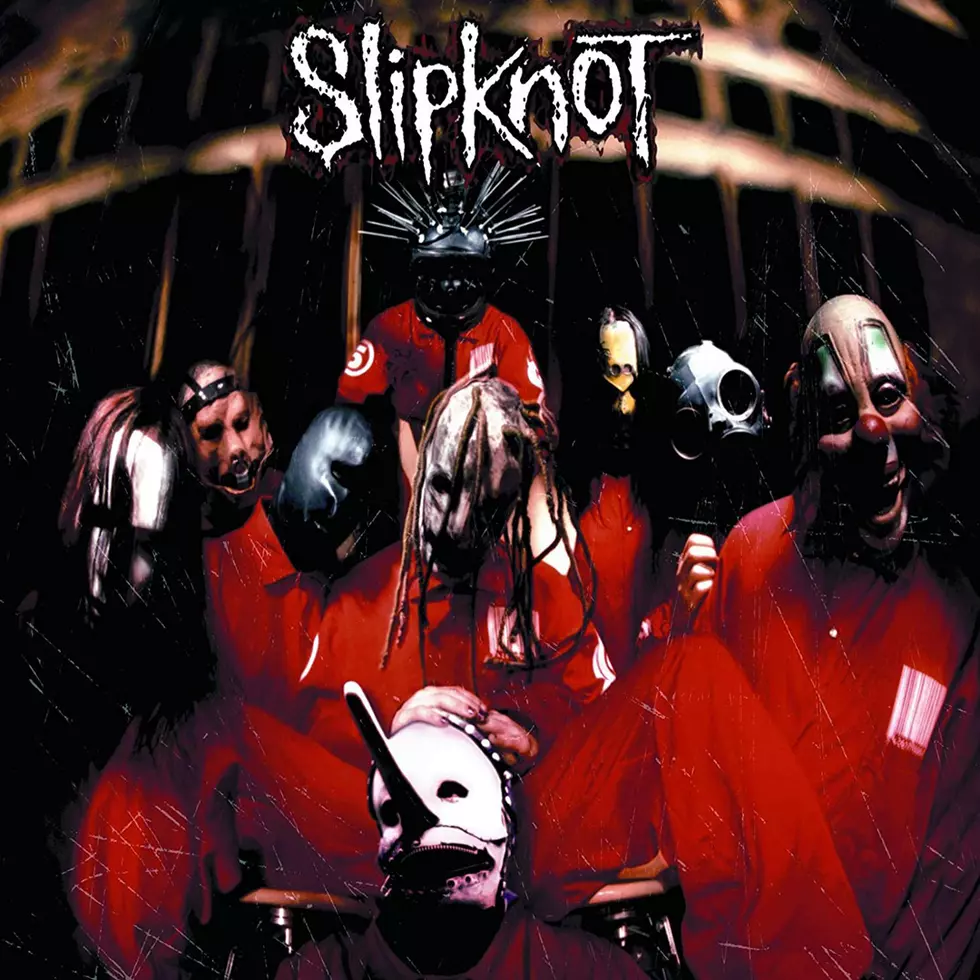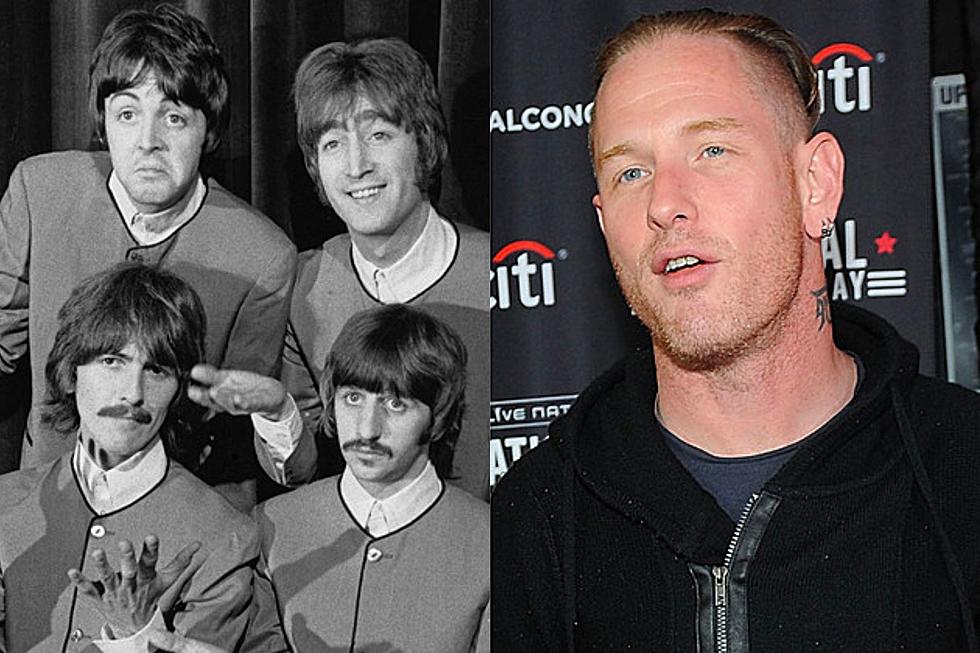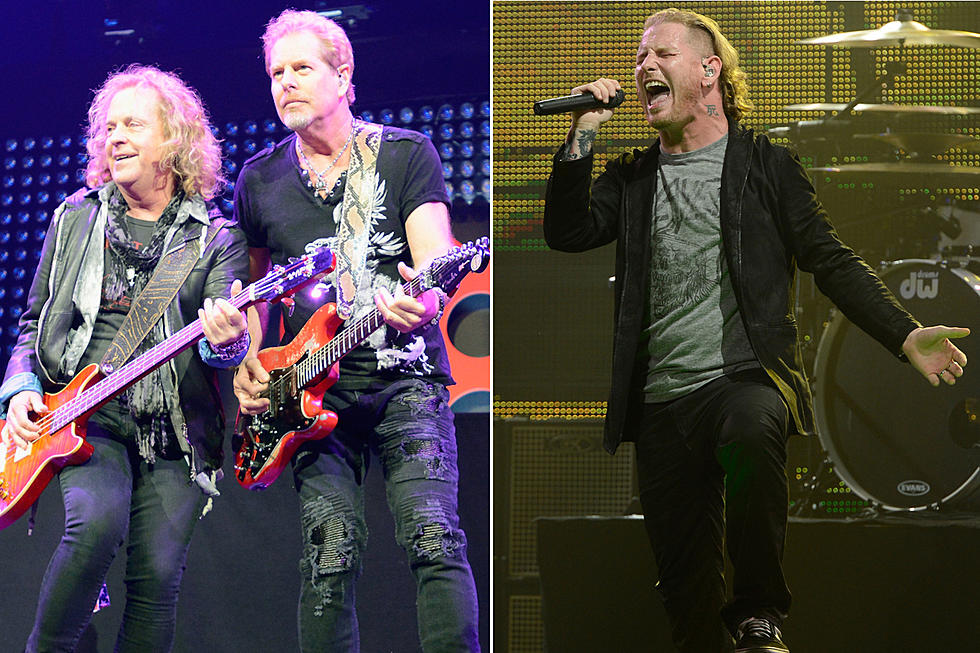
20 Years Ago: Slipknot Explode With Self-Titled Debut Album
By the time Slipknot’s self-titled debut album arrived on June 29, 1999, the band was already on its seventh lineup. Similarly, some of the songs that appeared were on their third recorded incarnations. And while it obviously hadn’t been an easy way do get to their first release, time would prove it was the right way.
Masterminded by founding members Shawn “Clown” Crahan, Joey Jordison and Paul Gray, the driving concept of Slipknot had been roughly defined in 1996 demo Mate. Feed. Kill. Repeat, then refined when they laid down a first attempt at a full LP in 1998. Their efforts – along with live appearances that were rapidly building a reputation as outrageous events – drew the attention of producer Ross Robinson, who’d achieved success with Korn, Limp Bizkit and others associated with the “nu metal” genre label.
After a visit to the Slipknot rehearsal studio, Robinson agreed to commit himself to working with them, and signed them to his own label before overseeing a seven-album deal with Roadrunner Records. “If the truth be told, it was really my wife who persuaded me to sign Slipknot,” boss Monte Conner told Metal Hammer in 2001. “I really wasn’t sure I liked them but I was prevaricating.”
The band’s first meeting with their new business partners impressed Roadrunner employee Cory Brennan, who’d later manage the band. “Clown shook my hand and said, 'How does it feel to meet your first platinum artist?'" he recalled. "And he did that to everybody, including the president and owner of the company. Then the three of them sat there and told us how they were gonna, one day, have hydraulic drums that they would weld themselves, which would go 15 feet in the air and turn upside-down, and how they were gonna be the biggest band in the world. Everything he said they'd do came true."
First, though, the album had to exist; and in September 1998, the band headed to Indigo Ranch in California for what would become infamously extreme recording sessions. “I was working out every day just to stay on top of that record,” Robinson said later. “It was spontaneous, it was violent. Things were getting broken. We were out there away from anyone else, nobody dropping by or hanging out, it got crazy really quickly.”
Frontman Corey Taylor added: “Ross pushed us and we pushed back. It was a fight. Ross was throwing punches at us. He was so into it. You can hear that on the record.”
Details of those sessions sometimes seem difficult to believe. Revolver reported that Robinson “threw potted plants at Jordison so he would have to duck them while he was playing drums” and that he “made Chris Fehn drink two gallons of water 'til he was on the verge of throwing up to get a mic'd mallet sound out of his stomach.” The producer would “try to knock instruments out of band members' hands while they were playing, shouting at them, "You can play that shit harder!"
Taylor recalled: “By the end, I was literally broken completely in half and wide open and bawling and I couldn't stop crying. I was throwing up all over the fucking place. At one point, the vocal booth smelled so bad.”
Slipknot - ‘Wait and Bleed’
Towards the end of the year, believing that the majority of the work was done, Slipknot took a break over Christmas to recover; and at that point guitarist Josh Brainard decided he’d had enough, later explaining: “Some decisions were made that I wasn’t particularly happy with.” In response, the band hired Jim Root from Taylor’s other band, Stone Sour, finally cementing a lineup that lasted until the death of Gray in 2010. Jordison and Robinson mixed the tracks using analog technology, believing it would retain more of the music’s intensity. Then came the job of selling Slipknot to the world.
One of the best moves Roadrunner made was to get the band onto Ozzy Osbourne’s Ozzfest tour of 1999. While it was only the opening slot, the nine-man powerhouse’s energetic performances presented the right message to the right audience. "[Y]ou could tell something was happening," Taylor remembered in 2015. "Something was becoming fucking crazy. The album hadn’t even come out yet. It came out halfway through that tour. So really there was nothing to prepare anybody for anything. And then after Ozzfest ’99 ended, we had three days off and we went right into the Coal Chamber tour where we were third on the bill, right below Machine Head.
"Halfway through that tour, we ended up switching places with Machine Head and becoming direct support. Because we would play, and this is nothing against any of these bands, nothing at all, we’d play and half the audience would leave after. It was no shit. We didn’t have anywhere to go after we played so we’d go out to the audience and hang out, watch the other bands, and we’d watch people streaming out—buying our merch and heading out. So it became a point where nobody wanted to take us out on the road with them. So we had to headline out of necessity."
Within months Slipknot had become the label’s best-ever seller, the fastest-selling debut by a metal band in history, and the 98th best-selling album of the year. It reached an astonishing No. 51 on the Billboard chart and the track “Wait and Bleed” was nominated for a Grammy. At one award ceremony in London, U.K., having won three gongs, the band smashed their chairs off their table, insulted the audience during acceptance speeches and even set part of the room on fire – all of which endeared them even more to the rising number of “maggots” who were going to love the band forever.
Amid its success, Slipknot became the subject of a legal threat because two of its tracks had been inspired by a story the band discovered online. “Purity” and “Frail Limb Nursery” included elements informed by a report of a girl named Purity Knight who’d been kidnapped and buried alive. It had been presented as fact by the website Crime Scene, but in reality the site published fictional accounts as if they were real, meaning that, technically, Slipknot had breached copyright. As a result both tracks were removed from the album – but Taylor said in 2001 biography Slipknot: Inside the Sickness, Behind the Masks: "I still think the story's real. It fucked our whole world up when we read it. Can you imagine a girl being buried in a box and have all this lecherous bullshit drip down on her from this guy? It just hurts your head.”
Slipknot - ‘Spit It Out'
Perhaps because of the Ross Robinson connection, and perhaps simply because the band included a DJ, Slipknot attracted the nu metal tag – which upset drummer Jordison in the extreme. “If you listen to a song like ‘Get This’ … or ‘Surfacing’ or ‘[sic]’ or even like fucking ‘Scissors,’ the roots are death metal, thrash, speed metal, and I could go on and on about all those bands,” he said. “[N]one of those fuckers in the other bands they lump us with could contend with that.”
In 2016 Taylor reflected: “I think we’re just kind of our own genre, to be honest. When you hear us, you immediately know it’s us. I think that really kinda came down to A, the timing of when we came out, and B, the fact that we were still kinda using a lot of hip-hop elements… I think we were more of a kind of pre-cursor to what they call the New Wave of American Heavy Metal. I thought we were kinda filling in that gap.” Citing other nu metal outfits including Korn and Deftones, he added: “they allowed bands like us to have the freedom to explore. … Music is about the future; it’s not about what you did, it’s about what you’re going to do.”
He’d previously said of the songwriting process for Slipknot: “We hadn’t recorded the album yet; we hadn’t gone out and toured; we didn’t know how people were going to take us. So we’d just written the songs for us. There was no audience until then.” Robinson added: “It’s a piece of magic. We made it for us.” Label boss Conner paid tribute to his signings’ explosive victory, noting: “There’s no doubt that the album opened the door to a lot more very extreme bands crossing into the mainstream.”
Slipknot - ‘Scissors’
A Complete Guide to Slipknot Lineup Changes
More From Ultimate Classic Rock









